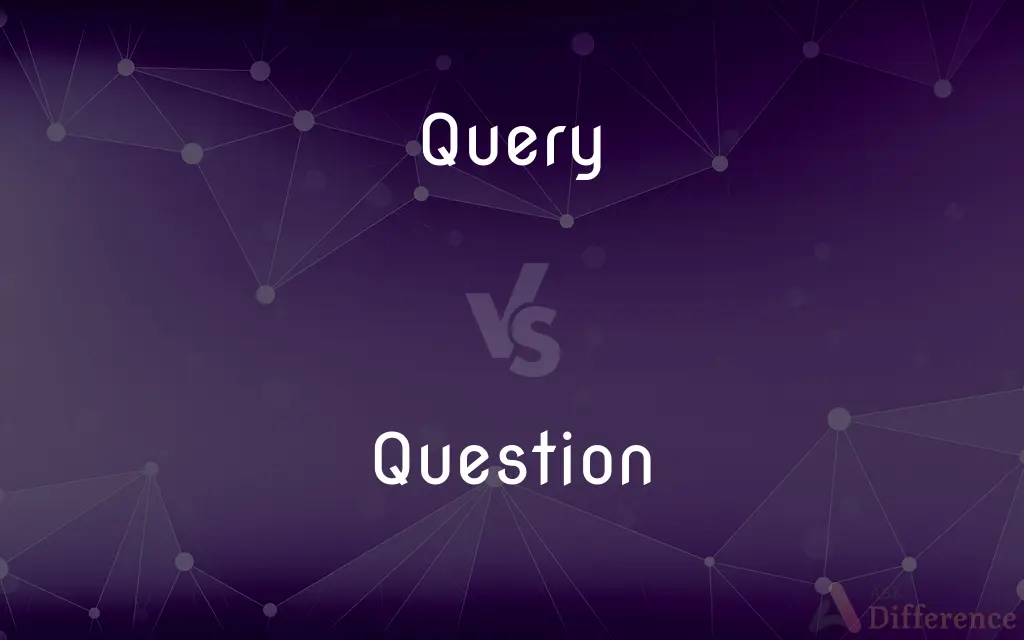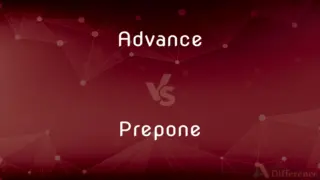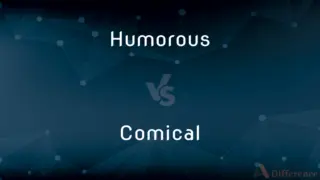Query vs. Question — What's the Difference?
Edited by Tayyaba Rehman — By Maham Liaqat — Updated on March 4, 2024
Query implies a request for information or clarification, often technical or specific, while a question is a broader inquiry seeking knowledge, explanation, or answer.

Difference Between Query and Question
Table of Contents
ADVERTISEMENT
Key Differences
A query is typically used in computing and information science to retrieve information from a database, implying a structured request using specific syntax or language. Whereas, a question is a general form of inquiry that can be asked in any context, not limited by structure or field, seeking an answer or clarification.
Queries often require a certain level of knowledge about the database language or search technique to formulate effectively. On the other hand, questions can be asked by anyone regardless of their technical expertise, aiming to understand or learn about something.
Queries are executed by a database management system to fetch data that meets certain criteria. Whereas, questions are posed to a person or a group of people and do not require a specific system or format for responses.
Queries are highly specific, with the precision of the inquiry affecting the quality of the result. In contrast, questions can be open-ended, allowing for a wide range of responses and discussions, which may or may not require precision.
The response to a query is usually data or information that directly satisfies the criteria of the request. On the other hand, the answer to a question can be subjective, varying based on the respondent's knowledge, opinion, or interpretation.
ADVERTISEMENT
Comparison Chart
Context
Primarily technical or database-related
Any context
Structure
Requires specific syntax or language
Open or structured format
Knowledge Required
Often requires technical knowledge to formulate
Can be asked by anyone
Execution
Executed by systems (e.g., databases)
Posed to individuals or groups
Response Type
Specific data/information
Subjective answers, explanations, or discussions
Compare with Definitions
Query
An act of questioning in a formal manner.
The scientist's query about the experiment's data was answered promptly.
Question
A sentence formulated to elicit information.
The teacher asked a question to test the students' understanding.
Query
An inquiry into a system to retrieve specific information.
She submitted a query to check the status of her online order.
Question
An inquiry that seeks an answer, clarification, or explanation.
Her question about the theory sparked a lively debate.
Query
A search operation in computing.
His query utilized advanced filters to narrow down the search results.
Question
A request for information.
He had a question about the deadline for the project submission.
Query
A precise request for information from a database.
The database administrator executed a query to find all users registered in 2021.
Question
An expression of doubt or uncertainty.
There was a question regarding the accuracy of the historical data.
Query
A method of questioning the system's data.
The query for the most popular product took milliseconds to run.
Question
A probe into someone's knowledge or opinion.
The interview included several questions on current events.
Query
A question; an inquiry.
Question
A sentence, phrase, or gesture that seeks information through a reply.
Query
A doubt in the mind; a mental reservation.
Question
To ask a question or questions of (someone).
Query
A notation, usually a question mark, calling attention to an item in order to question its validity or accuracy.
Question
To interrogate (a suspect, for example).
Query
To put a question to (a person).
Question
To pose a question or questions regarding (something); analyze or examine
Researchers questioning which of the methods will work.
Query
To put questions about; to elicit by questioning; to inquire into; as, to query the items or the amount; to query the motive or the fact.
Question
To express doubt about; dispute
Questioned his sincerity.
Questioned the expense report.
Query
An instance of questioning;
There was a question about my training
We made inquiries of all those who were present
Question
To ask questions.
Question
A sentence, phrase or word which asks for information, reply or response; an interrogative.
What is your question?
Common Curiosities
Are queries only used in computing?
Primarily, yes, queries are used in computing to retrieve information from databases, but the concept can apply in other contexts requiring specific information.
What is a query?
A query is a request for specific information from a database or system, often requiring technical knowledge to formulate.
What is a question?
A question is an inquiry that seeks information, clarification, or an answer, not limited to any specific context or format.
How do queries differ from questions?
Queries are technical requests for information, typically from databases, requiring specific syntax, while questions are broader inquiries for understanding or information.
What makes a good query in a database?
A good query is precise, effectively utilizes the database's language, and efficiently retrieves the required information.
Can anyone ask a question?
Yes, anyone can ask a question, regardless of their knowledge or expertise.
Is it possible for a query to yield multiple answers?
Yes, a query can yield multiple answers if the criteria match multiple records or data points in a database.
Can a query be considered a question?
Yes, a query can be considered a specific type of question, especially in technical contexts.
Can a question be open-ended?
Yes, questions can be open-ended, allowing for a wide range of responses and encouraging discussion.
How does the context affect the formulation of a query or question?
The context determines the structure, specificity, and expected response, with queries requiring technical accuracy and questions varying in formality.
Are questions subjective?
Questions can be subjective, especially when they probe opinions, interpretations, or explanations, unlike the objective nature of most queries.
What skills are necessary to formulate effective queries?
Formulating effective queries requires knowledge of database languages, understanding of the database structure, and clarity on the information needed.
Do all questions require an answer?
While questions seek answers, not all of them may receive a direct or satisfactory response, depending on their nature.
How do questions facilitate learning?
Questions stimulate thinking, encourage exploration, and can lead to a deeper understanding of a topic through the answers or discussions they provoke.
How are queries executed?
Queries are executed by a database management system (DBMS) or a search engine, which processes the request and returns relevant data.
Share Your Discovery

Previous Comparison
Advance vs. Prepone
Next Comparison
Humorous vs. ComicalAuthor Spotlight
Written by
Maham LiaqatEdited by
Tayyaba RehmanTayyaba Rehman is a distinguished writer, currently serving as a primary contributor to askdifference.com. As a researcher in semantics and etymology, Tayyaba's passion for the complexity of languages and their distinctions has found a perfect home on the platform. Tayyaba delves into the intricacies of language, distinguishing between commonly confused words and phrases, thereby providing clarity for readers worldwide.













































